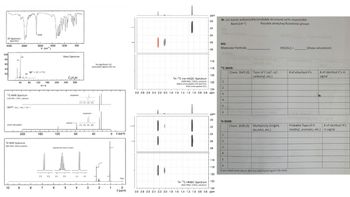
Chemistry
10th Edition
ISBN: 9781305957404
Author: Steven S. Zumdahl, Susan A. Zumdahl, Donald J. DeCoste
Publisher: Cengage Learning
expand_more
expand_more
format_list_bulleted
Question

Transcribed Image Text:4000
IR Spectrum
quid film)
100
80
60
40
YI
2248
41
10
3000
43
40
proton decoupled
"C NMR Spectrum
(150 MHz CDC, solution)
68
DEPT CH, CH, 1 CHT
9
200
¹H NMR Spectrum
(600 MHz, CDC, solution)
M83 (<1%)
80 120
2000
v (cm)
8
m/e
160
160
2.3
L
7
1600
2.2
200
ryper
1200
6
▬▬▬▬▬▬▬▬▬▬▬▬▬▬▬▬▬▬▬▬▬▬▬▬▬▬▬▬▬▬▬▬▬▬▬▬▬▬▬▬▬▬▬▬▬▬▬▬▬▬▬▬▬▬▬▬▬▬▬▬▬▬▬▬▬▬▬▬▬▬▬▬▬▬▬▬▬▬▬▬▬▬▬
120
Mass Spectrum
240
21 2.0
expansions (not to scale)
800
I
CsH₂N
280
5
expansion
80
4
270 255 256 255
expansion
No significant UV
absorption above 220 nm
27.0 245 250 255
1.0
3
40
L
2
0 8 (ppm)
1
1
TMS
L
1
0
8 (ppm)
10
¹H-¹C me-HSQC Spectrum
(600 MHz, CDC, solution)
Black cross-peaks CH and CH
Red cross-peaks CH₂
ppm
20
¹H-"C HMBC Spectrum
(600 MHz, CDC), solution)
-22
-24
-26
-28
116
118
120
122
124
3.0 2.8 2.6 2.4 2.2 2.0 1.8 1.6 1.4 1.2 1.0 0.8 0.6 ppm
ppm
20
22
-24
26
28
-116
118
-120
122
-124
3.0 2.8 2.6 2.4 2.2 2.0 1.8 1.6 1.4 1.2 1.0 0.8 0.6 ppm
IR: List bands and possible/probable structural units responsible
Band (cm³)
Possible stretches/functional groups
MS:
Molecular Formula
13C NMR:
1
2
3
4
5
6
Chem. Shift (8) Type of C (sp, sp²,
carbonyl, etc.)
¹H NMR:
Chem. Shift (8) Multiplicity (singlet,
doublet, etc.)
IHD(DU)=
1
2
3
4
5
6
If you need more space, add any additional signal info here:
(Show calculation)
# of attached H's
# of identical C's in
signal
Probable Type of H
(methyl, aromatic, etc.)
# of identical H's
in signal
Expert Solution
This question has been solved!
Explore an expertly crafted, step-by-step solution for a thorough understanding of key concepts.
This is a popular solution
Trending nowThis is a popular solution!
Step by stepSolved in 6 steps with 2 images

Knowledge Booster
Learn more about
Need a deep-dive on the concept behind this application? Look no further. Learn more about this topic, chemistry and related others by exploring similar questions and additional content below.Similar questions
- please do question 19 on the chartarrow_forward3000 15MHz carbon-13 NMR spectrum CDCi, solution off-resonance decoupled proton decoupled 200 In spectrum (nujol mull) 135 28 2000 100MHz proton NMR spectrum CDCi, solution 1600 V (cm-1) wayang 147 40 60 80 100 120 140 160 180 200 220 240 260 260 300 320 340 m/e 10% expansion at 130ppm 1670 mt 150. 2H 1200 800 mass spectrum 209 3H 124 180 160 140 120 100 80 60 40 UV spectrum a 14.999mg/10ml hexane 0.150mg/10ml hexane 1cm b 0.5cm cells 250 300 200 problem 3H 2 (nm) 20 0 350 6 (ppm) 8 (ppm)arrow_forwardUnknown 3 9 200 4000 8 7 6 3000 5 180 160 140 120 100 4 2000 80 1500 wavenumber (1/cm) 60 2 40 1 20 0 0 ¹H NMR data 0 (ppm) multiplicity integration 0.86 t 3 1.50 2.02 6.71 7.24 my 1000 13C NMR data (ppm) 13.7 19.0 37.9 176.4 500 sextet t S S 2 2 1 1arrow_forward
- IR Spectrum (liquid film) 184 4000 100 80 60 40 20 40 13C NMR Spectrum (50.0 MHz, CDCI, solution) proton decoupled 200 ¹H NMR Spectrum (600 MHz, CDCI, solution) 1 10 9 8 3000 % of base peak 80 128 my 2000 V (cm¹) 119 M+* 134 120 160 m/e expansion 124 ppm 160 1600 I 7 200 I 6 120 ppm 1200 800 Mass Spectrum C10 H14 280 solvent 80 240 I 5 7.4 1 4 expansion 3 Problem 95 UV Spectrum max 262 nm (log10 € 2.5) solvent: ethanol -CH3 C 40 7.2 2 1 0 8 (ppm) TMS 1 I 1 0 8 (ppm) 201arrow_forwardAssign each 13C of the molecule below to a peak in the following 13C NMR spectrum. Ideally, you will label the peaks on the spectrum from left to right as C1 through C8. حمدarrow_forwardAnalyze the CNMR spectrum below and identify the compoundarrow_forward
arrow_back_ios
arrow_forward_ios
Recommended textbooks for you
 ChemistryChemistryISBN:9781305957404Author:Steven S. Zumdahl, Susan A. Zumdahl, Donald J. DeCostePublisher:Cengage Learning
ChemistryChemistryISBN:9781305957404Author:Steven S. Zumdahl, Susan A. Zumdahl, Donald J. DeCostePublisher:Cengage Learning ChemistryChemistryISBN:9781259911156Author:Raymond Chang Dr., Jason Overby ProfessorPublisher:McGraw-Hill Education
ChemistryChemistryISBN:9781259911156Author:Raymond Chang Dr., Jason Overby ProfessorPublisher:McGraw-Hill Education Principles of Instrumental AnalysisChemistryISBN:9781305577213Author:Douglas A. Skoog, F. James Holler, Stanley R. CrouchPublisher:Cengage Learning
Principles of Instrumental AnalysisChemistryISBN:9781305577213Author:Douglas A. Skoog, F. James Holler, Stanley R. CrouchPublisher:Cengage Learning Organic ChemistryChemistryISBN:9780078021558Author:Janice Gorzynski Smith Dr.Publisher:McGraw-Hill Education
Organic ChemistryChemistryISBN:9780078021558Author:Janice Gorzynski Smith Dr.Publisher:McGraw-Hill Education Chemistry: Principles and ReactionsChemistryISBN:9781305079373Author:William L. Masterton, Cecile N. HurleyPublisher:Cengage Learning
Chemistry: Principles and ReactionsChemistryISBN:9781305079373Author:William L. Masterton, Cecile N. HurleyPublisher:Cengage Learning Elementary Principles of Chemical Processes, Bind...ChemistryISBN:9781118431221Author:Richard M. Felder, Ronald W. Rousseau, Lisa G. BullardPublisher:WILEY
Elementary Principles of Chemical Processes, Bind...ChemistryISBN:9781118431221Author:Richard M. Felder, Ronald W. Rousseau, Lisa G. BullardPublisher:WILEY

Chemistry
Chemistry
ISBN:9781305957404
Author:Steven S. Zumdahl, Susan A. Zumdahl, Donald J. DeCoste
Publisher:Cengage Learning

Chemistry
Chemistry
ISBN:9781259911156
Author:Raymond Chang Dr., Jason Overby Professor
Publisher:McGraw-Hill Education

Principles of Instrumental Analysis
Chemistry
ISBN:9781305577213
Author:Douglas A. Skoog, F. James Holler, Stanley R. Crouch
Publisher:Cengage Learning

Organic Chemistry
Chemistry
ISBN:9780078021558
Author:Janice Gorzynski Smith Dr.
Publisher:McGraw-Hill Education

Chemistry: Principles and Reactions
Chemistry
ISBN:9781305079373
Author:William L. Masterton, Cecile N. Hurley
Publisher:Cengage Learning

Elementary Principles of Chemical Processes, Bind...
Chemistry
ISBN:9781118431221
Author:Richard M. Felder, Ronald W. Rousseau, Lisa G. Bullard
Publisher:WILEY